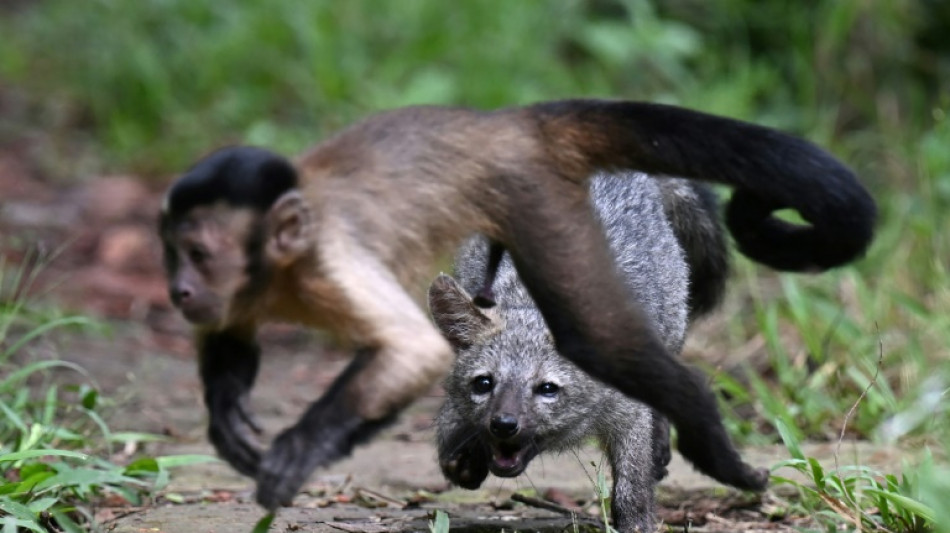
-
 Pricier trainers? Adidas warns on US tariff impact
Pricier trainers? Adidas warns on US tariff impact
-
Spain, Portugal rule out cyberattack for massive blackout

-
 Suryavanshi, 14, dubbed India's next superstar after shattering records
Suryavanshi, 14, dubbed India's next superstar after shattering records
-
Power back in Spain, Portugal after massive blackout

-
 Pakistan says it shot down Indian drone along Kashmir border
Pakistan says it shot down Indian drone along Kashmir border
-
Cardinals run the media gauntlet ahead of conclave

-
 BP profit drops 70% amid pivot back to oil and gas
BP profit drops 70% amid pivot back to oil and gas
-
Iran says fire contained after deadly blast at key port

-
 Irish rappers Kneecap deny support for Hamas, Hezbollah
Irish rappers Kneecap deny support for Hamas, Hezbollah
-
Blackout plunges Spain into chaotic night of darkness
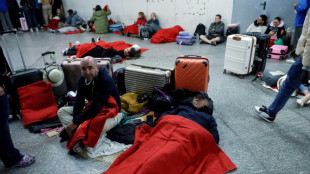
-
 Convicted cardinal confirms he will sit out conclave
Convicted cardinal confirms he will sit out conclave
-
Kashmiris fortify bunkers anticipating India-Pakistan crossfire
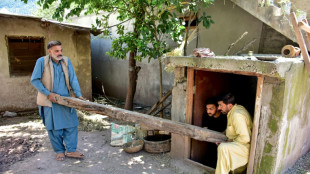
-
 Adidas warns US tariffs to push up prices
Adidas warns US tariffs to push up prices
-
Markets boosted as Trump softens tariff pain for auto firms

-
 Suryavanshi, 14, dubbed 'next superstar' after batting records tumble
Suryavanshi, 14, dubbed 'next superstar' after batting records tumble
-
Australian doubles player Purcell accepts 18-month doping ban

-
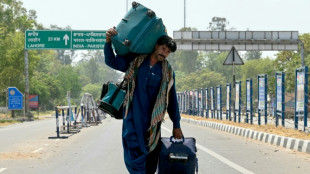 Kashmir attack unites political foes in India, Pakistan
Kashmir attack unites political foes in India, Pakistan
-
Croatia hotel toasts dizzying century of stars, sovereigns and champagne

-
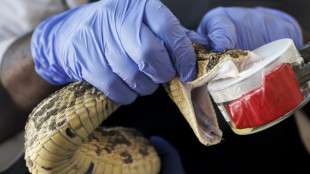 Kenya's desperate need for more snake antivenom
Kenya's desperate need for more snake antivenom
-
Les Kiss in frame with Wallabies set to name new coach

-
 Cavaliers scorch Heat, Warriors down Rockets in thriller
Cavaliers scorch Heat, Warriors down Rockets in thriller
-
Opposition wins Trinidad and Tobago election, returning Persad-Bissessar as PM

-
 Study sheds light on origin of Australia's odd echidna
Study sheds light on origin of Australia's odd echidna
-
France tries Syrian Islamist rebel ex-spokesman on war crime charges
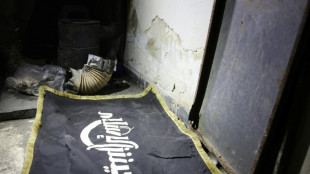
-
 Trump boasts of 'fun' 100 days, but Americans disenchanted
Trump boasts of 'fun' 100 days, but Americans disenchanted
-
Elitist no more, caviar is turning casual
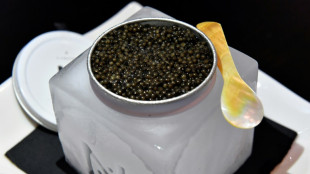
-
 Amnesty accuses Israel of 'live-streamed genocide' against Gaza Palestinians
Amnesty accuses Israel of 'live-streamed genocide' against Gaza Palestinians
-
Inter slump puts season at risk ahead of daunting Barca trip

-
 Power returns to most of Spain, Portugal after massive blackout
Power returns to most of Spain, Portugal after massive blackout
-
'I have hope': Vietnam Babylift survivor's search for birth mother

-
 US climate assessment thrown into doubt as Trump dismisses authors
US climate assessment thrown into doubt as Trump dismisses authors
-
Venezuelan president slams US over little girl's 'abduction'

-
 Hard-right upstarts eye big gains in local UK polls
Hard-right upstarts eye big gains in local UK polls
-
Skulls, smoke and spirits: Thai ceremony for the unclaimed dead
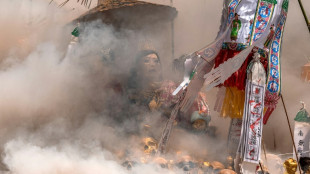
-
 Canada's Carney: political newcomer who says he's best in a crisis
Canada's Carney: political newcomer who says he's best in a crisis
-
Cavaliers scorch Heat to seal series sweep

-
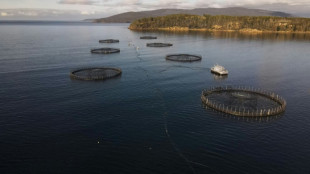 Dead salmon create election stink on Australian island
Dead salmon create election stink on Australian island
-
Mic check: Singapore's podcast boom amplifies opposition voices

-
 Markets rise as traders gear up for earnings, key jobs data
Markets rise as traders gear up for earnings, key jobs data
-
Congress passes 'revenge porn' ban, sending it to Trump

-
 Spain and Portugal work to restore power after massive blackout
Spain and Portugal work to restore power after massive blackout
-
Less-thirsty rice offers hope in drought-stricken Chile

-
 Yamal stardust could give Barca edge on Inter Milan
Yamal stardust could give Barca edge on Inter Milan
-
NioCorp Engages Engineering Firms to Update Elk Creek Project Feasibility Study

-
 Global Sports Brand U.S. Polo Assn. Delivers Record $2.5 Billion in Retail Sales for 2024, Targets $3 Billion and 1,500 U.S. Polo Assn. Stores
Global Sports Brand U.S. Polo Assn. Delivers Record $2.5 Billion in Retail Sales for 2024, Targets $3 Billion and 1,500 U.S. Polo Assn. Stores
-
Meridian's Drilling Extends High-Grade Gold-Copper Ore Zone at Cabacal Via Gold Veins Grading up to 276g/t Au

-
 Measles is Likely to Become Endemic - NanoViricides Is Testing a Drug to Combat It
Measles is Likely to Become Endemic - NanoViricides Is Testing a Drug to Combat It
-
Monogram Technologies Granted Regulatory Approval to Import mBôs TKA System for Clinical Investigation in India

-
 The Alkaline Water Company Announces Co-Packing Agreement with Sang Beverages for TEN Alkaline Spring Water
The Alkaline Water Company Announces Co-Packing Agreement with Sang Beverages for TEN Alkaline Spring Water
-
Evotec SE to Announce Results for the First Quarter 2025 on 6 May 2025


Repentant ranchers rescuing Colombian wildlife
Two newborn pumas and a convalescing porcupine share a room in the home of the Zapata family, which has renounced livestock farming to focus on stewardship of the Colombian Amazon and its animals uprooted by deforestation.
Just over a decade ago, the Zapatas decided to change their ways, and instead of cutting back trees for pasture, plant new ones.
They sold their cows and let the jungle claim back most of their land in San Jose de Guaviare in southern Colombia.
Today, the family of three work to rehabilitate animals affected in a variety of cruel ways by humanity's encroachment on nature.
They sacrificed part of their home and backyard, where for the moment they house 60 creatures, ranging from monkeys, birds and armadillos to a spotted wild cat known as an ocelot.
"This farm was dedicated to cattle raising: 56 hectares of which only about 12 (hectares) were... forest," said Dora Sanchez, who runs the ranch-turned-reserve with husband Hector Zapata, 57, and daughter Samantha, 23.
"Little by little, my family understood that (conservation) is a good thing," the 48-year-old told AFP on the former ranch now called the Nupana reserve.
"We must preserve and protect the forest, because it is the source of life... We are one hundred percent convinced that it is the jungle" that is the future, she added.
- 'Positive effect' -
Like many others in this rural department of Guaviare, the Zapatas were attracted by the dream of making a new life in a "land without men for men without land."
When Sanchez and Zapata moved there in 1997, most of the locals were raising cattle or planting coca -- the raw ingredient of cocaine, of which Colombia is the world's main producer.
Both cattle and cocaine are jungle killers and Guaviare lost some 25,000 hectares of forest just in 2021, according to authorities.
The family raised cattle for 15 years before deciding this was no longer for them. By 2012, the last cows left the farm.
"I began to do some experiments, to set up agroforestry systems and we began to see the positive effect," said Sanchez, an agroforestry engineer by training.
"The forest began to change, the fauna began to return. We improved the water conditions and the soil began to improve."
Today, the reserve has 40 hectares of jungle, said Sanchez, and tourists visit its eco trail. Some "adopt" an animal and make monthly contributions for its upkeep.
Baby animals are cared for in the family house.
Roaming free on the property, a small grey fox and a capuchin monkey that lost a leg chase each other around playfully -- among the animals too domesticated or weak to return to the wild.
Other, more potentially dangerous creatures, must live out their days in enclosures "because they do not have the necessary skills, they cannot survive, they do not recognize that a predator can attack them," said Samantha Zapata, an agronomy student.
Some of the animals at the reserve had been confiscated from people who kept them as pets or tried to sell them.
Others were found injured or abandoned in the ever-shrinking Amazon.
The Zapatas keep the wild animals separately in cages, giving them medicine and food to get them back on their feet and hopefully back to the wild.
"There are many challenges, because each animal has its own characteristics and behavior," said Hector Zapata, adding they had learnt a lot through practical experience.
"Taking care of them, guiding them step by step to a... release, I think is one of the most difficult challenges we have."
- Learn to hunt -
Samantha bottle feeds the baby pumas with mixed emotions.
"They are very beautiful and we would normally never have been able to see them so close, but it is sad because (people) killed their mother," she said.
The cubs were rescued by the CDA environmental agency and brought to the ranch after a citizen reported them abandoned in the jungle, their eyes closed and with their umbilical cords still attached.
Locals told the CDA some farmers had been killing wild cats in the area to protect their sheep.
"At the age of four, five months we will begin to give them meat... and live prey so that they can learn to hunt and can develop naturally," said Samantha Zapata.
Hopefully, "they will not be condemned to living in a cage."
P.Costa--AMWN

